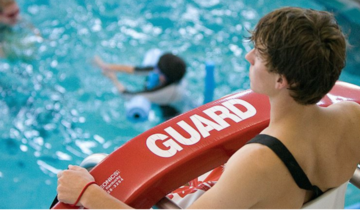As in most sports, the organization of competitive swimming events requires people who are responsible for dispensing justice. Although they often go unnoticed, the role of judges in swimming is really important. We tell you about their obligations and functions!
The image we have of referees in different sports usually includes them as just another actor on the field of play. This is the case in traditional sports such as football, basketball, rugby, or handball.
However, in other disciplines, such as swimming with lifeguarding class, they go almost unnoticed. This does not mean in any way its role is less relevant. Learn about everything the judges do in swimming in each of the competitions!
Judges in swimming: how many are there?
In swimming, there is not a single person in charge of controlling that everything is carried out under the rules that govern this sport. In fact, there are several referees in each event and each one of them has a particular function. In this way, we can differentiate:
Referee: is the general person in charge of auditing. He signals with a whistle for swimmers to get ready and take their positions on the starting grid or in the water. Once all of this is done, he extends his arm and delegates the responsibility to the starter.
Start judge: as its name indicates, it is responsible for ordering and controlling the start of each race. He stands to one side of the platforms and is the one who gives the order to execute the start, in addition to deciding if it has been valid.
Lap inspectors: there is one per lane at each end of the pool, this means that there can be up to 16 of them. Your task is to check that the competitors complete the entire course and that the turns are carried out correctly.
Style judges accompany the swimmer on his journey. They check that the requirements and technique of each style are met and also help the lap judges with the turns.
Finish judges: they may or may not be present, as this aspect can be automated. Its function is to supervise the arrival of the swimmers to the finish line.
Other judges in competitive swimming
To those previously named, we can also add other functions somewhat more linked to administrative issues, as detailed in this Judges Manual.
This includes the task of the scorers, who are responsible for organizing, communicating, and certifying the results and records obtained. It also includes the timekeepers, who are responsible for each swimmer's time (this is automated in high-level competitions these days).
Likewise, we must also appoint the senior officer, who reviews the state of the track and the swimmers' clothing, among other issues; and the person in charge of the false start rope, which is placed at a certain distance from the start to indicate, along with an audible signal, that there has been an invalid start.
Punitive powers of judges in swimming
One of the most important responsibilities of these referees is to sanction athletes who do not respect the rules in a competition. These sanctions are communicated immediately and there is, from that moment, a period of 30 minutes for the affected party or their representatives to make the relevant claims.
Disqualifications and other less serious sanctions are the responsibility of the referee of the competition. There is the possibility that it is he himself who observes the infraction or that it is reported by one of the officials of the competition. In the latter case, the final decision will be made by the main referee.
Final remarks
To conclude, it is opportune to clarify that the judges must wear clothing that identifies them and they must have the necessary material to carry out their function in each competition. This is left to the organizers, generally.
On the other hand, there must be effective communication between them, as well as good treatment towards the swimmers. The head referee's assistants inform you of rule violations in a post-competition report. The test, the series, the lane, and the fault committed are detailed in this.
In events where there is an announcer or entertainer, it is essential that the referee does not let the referee replace him in his duties, for example, when announcing the preparation of the athletes.
In short, being a swimming judge is a huge responsibility that demands effort, concentration, and commitment. Respect and the search for sporting justice must be above any other value in the case of these collaborators, often 'forgotten' at the end of the day, but essential for everything to turn out in the best way.







0 Comments